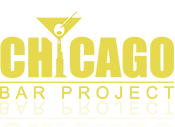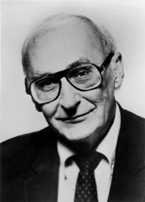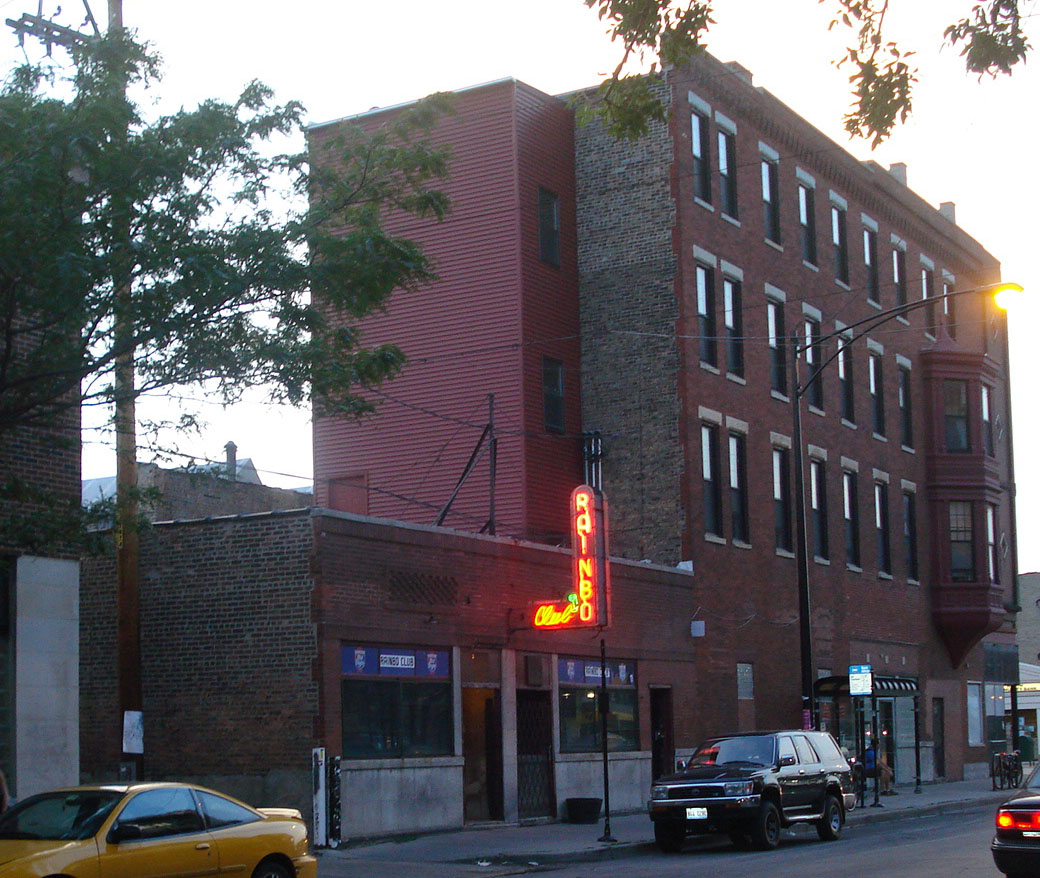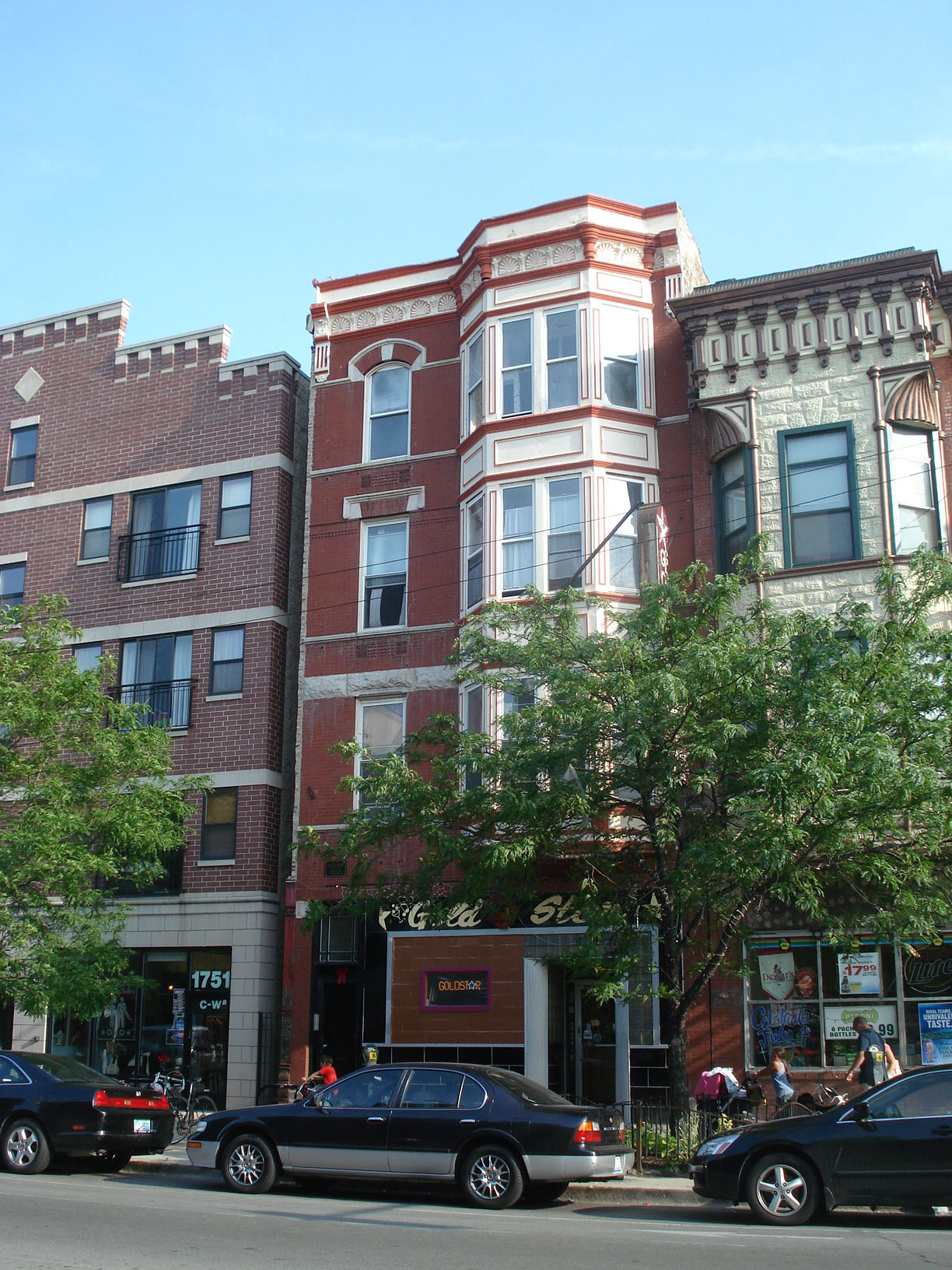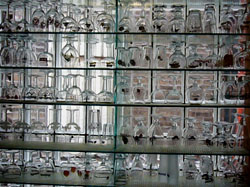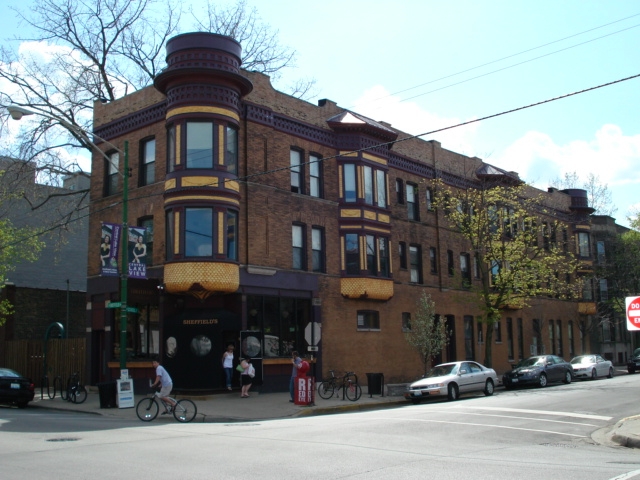Here you will find Chicago’s best writers and poets with a nod to some of the city’s best taverns.
Chicago has a rich history of writers, from its poets (Carl Sandburg), to its National Book Award winners (Nelson Algren), to its Pulitzer Prize winners for fiction (Saul Bellow) and commentary (Mike Royko). It’s not all history, filled with voices of the past, but is rather alive and vibrant, from The Time Traveler’s Wife to the Uptown Poetry Slam. Below is a summary of where you find Chicago’s rich literary tradition carrying on at some of the best watering holes in town.
How about a literary Chicago pub crawl?
By Pub
By Writer
By Event
- Beer sampling
- Book Clubs (with beer)
- Reading Series
- Travel & Cultural Discussions
- Drinking & Writing Brewery
- International Night
- Open Mic
- Poetry Slams
- Poetry Series
- Monthly Release Parties
Writers and Pubs
![]()
Billy Goat Tavern
Mike Royko
Mike Royko grew up above his parents’ Blue Sky Tavern, where he actually bartended, along with a few other spots in the neighborhood also owned by his father. Royko summed his tavern experience in this way (in 1979):
“Saw a one-legged man dance on a bar in Munich. Got winked at by a one-eyed woman in Marseille. Went into Schaller’s Pump in Mayor Daley’s neighborhood on St. Patrick’s Day and escaped alive. Saw a man win a bet in Milwaukee that he could drink a quart of vodka in five minutes, and helped put him in the ambulance. Saw a man in Wyoming who was arrested for hitting a bartender on the head with a dog. Saw a 130-pound lady bartender named Kitty in Logan Square knock a 210-pound hillbilly unconscious with one punch to his brow. She had a quart jar of Polish pickles in her hand when she punched him,”
-excerpt from Mike Royko’s “Soaking up History,” as reprinted in Sez Who? Sez Me
Royko’s professional career as a reporter took off when he joined the Chicago Daily News in 1956. Royko also wrote a hard-hitting but widely lauded account of Mayor Richard J. Daley’s life, called Boss (1971) and many of his columns were incorporated into a series of books. The Chicago Daily News went bankrupt in 1978 at which time Royko moved over to the Chicago Sun-Times. After Rupert Murdoch bought the paper in 1984, Royko quit one day later to work for rival Chicago Tribune, claiming: “No self-respecting fish would be wrapped in a Murdoch paper” and that, “His goal is not quality journalism. His goal is vast power for Rupert Murdoch, political power.”
Sadly, Mike Royko’s biting satire came to a premature end in 1997, when he passed away from a brain aneurysm at the age of 64. At that time Royko was syndicated in over 800 newspapers across the country and wrote a column a day, five days a week for over 20 years, and he won the Pulitzer Prize for Commentary in 1972.
Billy Goat Tavern (under the Magnificent Mile)
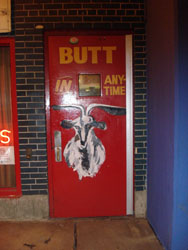 Royko was often found each day after work, holding court down at the Billy Goat in “Wise Guy’s Corner,” at across from the infamous grill where “cheezborgers” are flipped every day. Royko would entertain crowds by espousing local politics as the “voice of the little guy” with his everyman character he called “Slats Grobnik,” which was modeled after Finley Dunne’s character earlier in the century, Mr. Dooley. Royko famously eulogized Billy Goat Sianis, the original owner of the Billy Goat Tavern, when he passed away in the early morning hours of October 22, 1970: “It wasn’t until after three that William (Billy Goat) Sianis, the city’s greatest tavern keeper, would stop talking and allow his nephew, Sam, to help him into his car and drive a few blocks to the St. Clair Hotel, where he lived. Then he went to his room, fell over, and died. It was typical of Billy Goat that he would die during the only five hours of the day when his place wasn’t open for business.”
Royko was often found each day after work, holding court down at the Billy Goat in “Wise Guy’s Corner,” at across from the infamous grill where “cheezborgers” are flipped every day. Royko would entertain crowds by espousing local politics as the “voice of the little guy” with his everyman character he called “Slats Grobnik,” which was modeled after Finley Dunne’s character earlier in the century, Mr. Dooley. Royko famously eulogized Billy Goat Sianis, the original owner of the Billy Goat Tavern, when he passed away in the early morning hours of October 22, 1970: “It wasn’t until after three that William (Billy Goat) Sianis, the city’s greatest tavern keeper, would stop talking and allow his nephew, Sam, to help him into his car and drive a few blocks to the St. Clair Hotel, where he lived. Then he went to his room, fell over, and died. It was typical of Billy Goat that he would die during the only five hours of the day when his place wasn’t open for business.”
Rick Kogan
There’s so much history about Mike Royko and the Billy Goat Tavern that it could fill up a book. Thinking the same, the Sianis Family personally asked former Tempo editor, TV critic, WGN radio show host, and author, Rick Kogan, to write it, and he did: A Chicago Tavern: a Goat, a Curse and the American Dream – a must read for any Chicago tavern enthusiast.
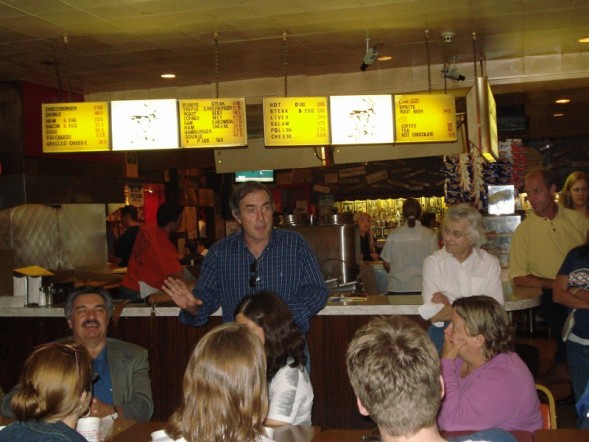
Saul Bellow
 Saul Bellow was born in a suburb of Montreal, in 1915, but was raised in Chicago’s Humboldt Park after his family moved here when he was nine. Bellow went to Tuhey High School (now Roberto Clemente), attended the University of Chicago, and then transferred and graduated from Northwestern University in 1937, with honors in sociology and anthropology. He went on to graduate work at the University of Wisconsin, and served in the Merchant Marine during World War II. Bellow commemorated Humboldt Park in The Adventures of Augie March (1954) and returned to it in Humboldt’s Gift (1975).
Saul Bellow was born in a suburb of Montreal, in 1915, but was raised in Chicago’s Humboldt Park after his family moved here when he was nine. Bellow went to Tuhey High School (now Roberto Clemente), attended the University of Chicago, and then transferred and graduated from Northwestern University in 1937, with honors in sociology and anthropology. He went on to graduate work at the University of Wisconsin, and served in the Merchant Marine during World War II. Bellow commemorated Humboldt Park in The Adventures of Augie March (1954) and returned to it in Humboldt’s Gift (1975).
Here’s an excerpt from the Literary Encyclopedia:
“The immigrant tenements of Humboldt Park, Chicago, soon captured the young Bellow’s nostalgic imagination. Chicago in the 1920s boasted a population of approximately 125,000 Jews. Idiomatic immigrant English in Humboldt’s Park was enhanced by Yiddish, Hebrew, Russian, and other European languages, a rich linguistic and cultural mix for a young Chicago immigrant child who would later aspire to be succeed Theodore Dreiser as Chicago’s social realist writer. He reveled in the surrounding neighborhoods with their gas street lights, balalaika music, lodges, clubs, congregations, relief associations and various ethnic community associations, stories about famous Chicago Mafia criminals and local characters. This material would appear in all his subsequent novels.”
Over the course of his career, Saul Bellow won the following awards:
- National Book Award for The Adventures of Augie March (1954)
- National Book Award and Pulitzer Prize for Herzog (1964)
- National Book Award for Mr. Sammler’s Planet (1970)
- Nobel Prize in Literature (1976)
I am an American, Chicago born — Chicago, that somber city — and go at things as I have taught myself, free-style, and will make the record in my own way: first to knock, first admitted; sometimes an innocent knock, sometimes a not so innocent. But a man’s character is his fate, says Heraclitus, and in the end there isn’t any way to disguise the nature of the knocks by acoustical work on the door or gloving the knuckles.”
– excerpt from Augie March
Studs had a most impressive career, including winning a Pulitzer Prize for General Non-Fiction with The Good War, but we here at Literary Chicago are most interested in his local exploration of Humboldt Park through interviews in the book, Division Street: America (1969). Studs recently passed away on October 31, 2008.
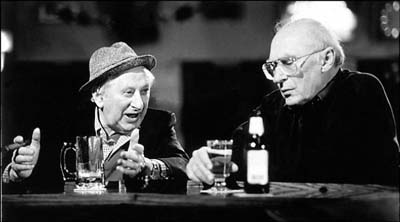
© 1991 Photo courtesy of Matthew Gilson
Writers Studs Terkel (left) and Mike Royko compare neighborhood taverns in a 1991 segment of PBS’s “The ’90s.”
California Clipper (Humboldt Park)
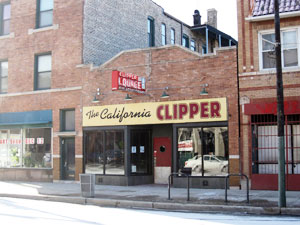 The California Clipper is located in the stomping grounds of both Saul Bellow and Studs Terkel, also hosts two series by the Guild Literary Complex:
The California Clipper is located in the stomping grounds of both Saul Bellow and Studs Terkel, also hosts two series by the Guild Literary Complex:
- Prose Series: features Chicago’s emerging and established prose writers for an evening of reading; writers compete for a $500 prize
- Palabra Pura: focus on Chicano and Latin writers presenting in both Spanish and English for 30 minutes
- Ok, it’s not literary, but the California Clipper hosts some of the city’s best rockabilly every weekend, and is haunted to boot
Woodlawn Tap (Hyde Park)
The Woodlawn Tap was a favorite of Saul Bellow as both student and professor at the University of Chicago, as well as visited by Dylan Thomas three times in one day while away from New York City and the White Horse Tavern (there is a great Greenwich Village Literary pub crawl offered by the Bakerloo Theatre Project).

Lottie’s Pub (Zagorski’s Tavern), Rainbo Club, Gold Star Bar and Nelson Algren
 Nelson AlgrenBorn “Nelson Ahlgren Abraham” to a Swedish father and convert to Judaism and Jewish-German mother in Detroit, Algren moved to Chicago when he was three, grew up in Albany Park, graduated from the University of Illinois with a BA in Journalism, and spent the majority of his adult years in Wicker Park back when Milwaukee Avenue was called “Polish Broadway.”
Nelson AlgrenBorn “Nelson Ahlgren Abraham” to a Swedish father and convert to Judaism and Jewish-German mother in Detroit, Algren moved to Chicago when he was three, grew up in Albany Park, graduated from the University of Illinois with a BA in Journalism, and spent the majority of his adult years in Wicker Park back when Milwaukee Avenue was called “Polish Broadway.”
Algren received the National Book Award for The Man with the Golden Arm (1950) but is more well known to locals for his superb novel, Chicago: City on the Make (1951). His work led to a love affair with the feminist French writer, Simone de Beauvoir and life companion of Jean-Paul Sartre, who, upon meeting Algren, took her to see the underbelly of Chicago, including the Polish bars in the city; she wrote about it in her book, Les Mandarins.
Algren passed away in 1981 and his life and work is commemorated in a fountain in the heart of Wicker Park and the Old Polish Broadway where Milwaukee, Division and Ashland meet. Famous Algren quotes include:
“I submit that literature is made upon any occasion that a challenge is put to the legal apparatus by conscience in touch with humanity. Now we all know.”
– excerpt from Chicago: City on the Make
“Never play cards with a man called Doc. Never eat at a place called Mom’s. Never sleep with a woman whose troubles are worse than your own.”
– excerpt from A Walk on the Wild Side
“Yet once you’ve come to be part of this particular patch, you’ll never love another. Like loving a woman with a broken nose, you may well find lovelier lovelies. But never a lovely so real.”
– excerpt from Chicago: City on the Make, 1951
“Between the curved steel of the El and the nearest Clark Street hockshop, between the penny arcade and the shooting gallery, between the basement gin-mill and the biggest juke in Bronzeville, the prairie is caught for keeps at last. Yet on nights when the blood-red neon of the tavern legends tether the arc-lamps to all the puddles left from last night’s rain, somewhere between the bright carnival of the boulevards and the dark girders of the El, ever so far and ever so faintly between the still grasses and the moving waters, clear as a cat’s cry on a midnight wind, the Pottawatomies mourn in the river reeds once more.”
– excerpt from Chicago: City on the Make
Lottie’s Pub (Bucktown)
 What is now Lottie’s dates back at least to 1928, when it was operated as the grocer of Wladislaus and Rose Behrendt. In 1934, the establishment was acquired by Walter Zagorski who ran the place as “Zagorski’s Tavern.” Zagorski went by the name “Lottie,” as he was a flamboyant transvestite, and possible hermaphrodite, that stood 6 feet tall and could personally “escort” unruly patrons out the door single-handedly. Lottie was as infamous as she was colorful. She ran a gambling operation in the basement, dubbed “Zagorski’s Rathskeller.” Access to the Rathskeller was through a private door and the place catered to gangsters, neighborhood residents and politicians alike. According to the Lottie’s website, “A simple knock on Lottie’s private basement door opens a world of escape and debauchery — lively parties, strip tease dancers, horse betting, and all-night poker games to those deemed worthy.”While we can’t be sure, it’s more than likely Lottie’s was one of the joints to which he took Ms. Beauvoir.
What is now Lottie’s dates back at least to 1928, when it was operated as the grocer of Wladislaus and Rose Behrendt. In 1934, the establishment was acquired by Walter Zagorski who ran the place as “Zagorski’s Tavern.” Zagorski went by the name “Lottie,” as he was a flamboyant transvestite, and possible hermaphrodite, that stood 6 feet tall and could personally “escort” unruly patrons out the door single-handedly. Lottie was as infamous as she was colorful. She ran a gambling operation in the basement, dubbed “Zagorski’s Rathskeller.” Access to the Rathskeller was through a private door and the place catered to gangsters, neighborhood residents and politicians alike. According to the Lottie’s website, “A simple knock on Lottie’s private basement door opens a world of escape and debauchery — lively parties, strip tease dancers, horse betting, and all-night poker games to those deemed worthy.”While we can’t be sure, it’s more than likely Lottie’s was one of the joints to which he took Ms. Beauvoir.
- Rainbo Club (Ukrainian Village) – like nearby Lottie’s Pub, was a speakeasy and featured burlesque girls that danced to the merriment of a blue-collar Polish crowd and Nelson Algren
- Gold Star Bar (Ukrainian Village) – rounds out the “Nelson Algren Trio” of bars frequented by the writer that are still around today
For more information on Nelson Algren, be sure to check out the Nelson Algren Committee.
Finley Dunne’s Tavern and Finley Dunne
Named after Finley Dunne, the first person to be baptized at Chicago’s Old St. Pat’s church in the West Loop, went on to write Mr. Dooley in Peace and War and frequently sparred in the media with Teddy Roosevelt
A.J. Liebling

responsible for Chicago’s nickname, “Second City,” after his book Chicago: The Second City was published in 1952 as an expansion on a series of articles on Chicago he wrote for the New Yorker.
“I have never heard “Mexicali Rose” sung so well as that night on West Madison Street. I arrived back in my hotel filled with that tranquil satisfaction that follows a revel in a strange town, in which nobody will turn up next day to remind you how dull you were.”
– excerpt from Chicago: The Second City by A.J. Liebling (1952)
Carl Sandburg
 Sadly, there is no pub tie-in that we know about, but here’s an excerpt from his poem Chicago:
Sadly, there is no pub tie-in that we know about, but here’s an excerpt from his poem Chicago:
“Hog Butcher for the World,
Tool Maker, Stacker of Wheat,
Player with Railroads and the Nation’s Freight Handler;
Stormy, husky, brawling,
City of the Big Shoulders”
Jack Kerouac
Not a Chicago writer, but Kerouac Jack’s (now Waterhouse) was named for him and he wrote this about Chicago in On the Road:
“Great Chicago glowed red before our eyes. We were suddenly on Madison Street among hordes of hobos, some of them sprawled out on the street with their feet on the curb, hundreds of others milling in the doorways of saloons and alleys…”

Other Literary Pubs and Events
Charleston (Bucktown)
Features the monthly Sunday Salon Chicago that brings together an inspiring “blend of new and established literary voices”
Danny’s Tavern (Bucktown)
The 3rd Wednesday of every month features the increasingly popular Danny’s Reading Series, where readings are given by poets and authors from Chicago and beyond; readings start at 7:30pm sharp and are followed by a DJ
Green Mill Cocktail Lounge (Uptown)
Since 1986, Marc Smith has hosted the Uptown Poetry Slam, that now takes place every Sunday from 7:00pm to 10:00pm. A $6 cover charge gets you in to see amateur poets perform modern slam poetry and compete for the favor of the audience
Hideout (Bucktown)
More known for its indie music scene, Hideout now hosts monthly release parties for Make Magazine
Hopleaf Bar (Andersonville)
Features performances by the Drinking & Writing Brewery, including How to Cure a Hangover (January 2, 9 & 16 beginning at 4pm for $15). Formerly hosted the Bookslut Reading Series with editor Jessa Crispin once a month upstairs, where three authors are featured and talk about their works.
Map Room (Bucktown)
Hosts beer school, offers encyclopedias and travel books, and a phenomenal beer selection and attracts the worldly, particularly with International Night every Tuesday, where a country is highlighted by free food and discussion
Sheffield’s Wine & Beer Garden (Lakeview)
Hosts the Reading Under the Influence each month. Why? Because everyone needs a literary hangover. A theme is selected, an author invited based upon a 500 word submission who then reads from their own work and that of a famous author; trivia questions are posed, about the famous one author, shots are done, prizes are won
Trace (Wrigleyville)
Safe Smiles is the name of the weekly multimedia open mic and performance series curated by the PolyRhythmic arts collective of Chicago; doors open and the signup list is started at 10pm. and PolyRhythmic asks for a $3 donation
Weeds Tavern (Goose Island)
Monday is Uncensored Poetry Night, vocal free-for-all for poets, complete with plenty of ribald language and sometimes bilingual poetry (English and Spanish), now hosted by Gregorio Gomez. This tradition began in 1987 with Marc Smith, who now hosts the Green Mill’s Uptown Poetry Slam on Sundays. Even Sergio performs the only two poems he has ever written, dating back to his years in middle school. He must recite them every week, as I witnessed the crowd yelling out the last word of every line in synch with Sergio. Weeds has also played host to poetry festivals and is a good example of where you can find some of the best poets in Chicago, both young and old.
